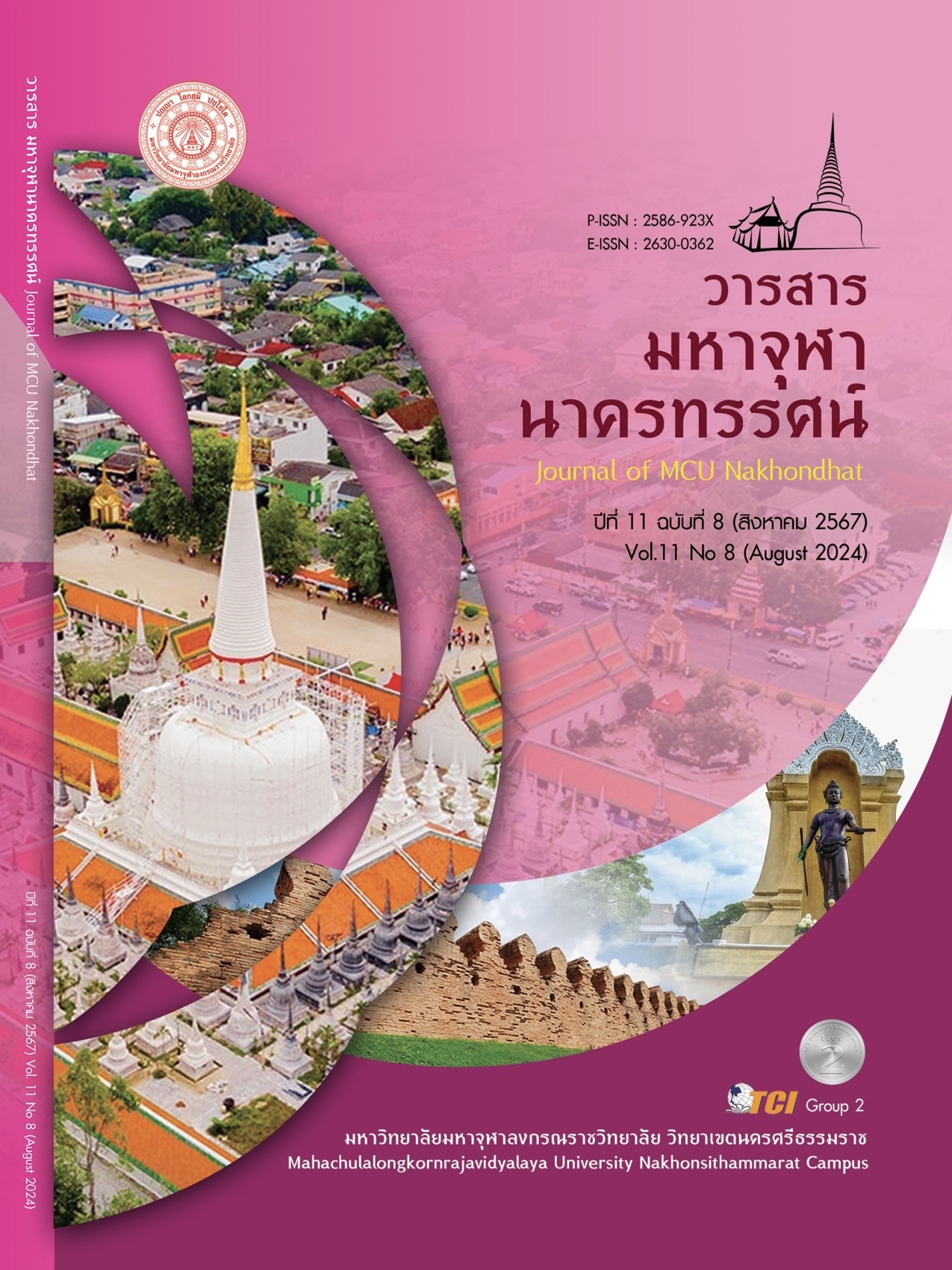A DEVELOPMENT OF WEB APPLICATION TO CREATE THE ATTRIBUTE OF UNDERSTANDING THE GENERATION GAP OF PATUMWAN DEMONSTRATION SCHOOL
Main Article Content
Abstract
The objectives of this research are 1) To develop a web application to develop an understanding the generation gap. 2) To study the understanding the generation gap among upper secondary school students of Patumwan Demonstration School 3) Tocompare understanding the generation gap among upper secondary school students of Patumwan Demonstration School.The sample group is 280 of upper secondary school students of Patumwan Demonstration School. The instruments used are consisted of 1) Web application to create an understanding the generation gap 2) Questionnaire on opinions of understanding the generation gap and 3) Experts Interview. Statistics applied in this research are frequency, percentage, mean and standard deviation, t-test analysis, and One-way ANOVA. The results of the research are as follows 1) Developing web applications divided into 5 steps: 1) Analysis 2) Design 3) Development
4) Implement and 5) Evaluation. There is a pretest and posttest when using the web application, which has content about generation gap divided into 4 generation gaps. This is the nature of the lesson and assessment of understanding in each age group. 2) There is the difference in understanding the generation gap among Upper secondary school students, teacher and parents at the statistical significance level of .05 and 3) Overall, there is no difference in the understanding the generation gap of students at the statistical significance level of .05. In the other hand, Evaluation of students after the experiment is significantly higher than before at statistical level of .05. In a part of Interacting and working with others.
Article Details

This work is licensed under a Creative Commons Attribution-NonCommercial-NoDerivatives 4.0 International License.
References
กรมกิจการผู้สูงอายุ. (2562). มาตรการขับเคลื่อนระเบียบวาระแห่งชาติ เรื่อง สังคมผู้สูงอายุ (ฉบับปรับปรุง). (พิมพ์ครั้งที่ 2). กรุงเทพมหานคร: อมรินทร์พริ้นติ้งแอนด์พับบลิชชิ่ง.
จุลนี เทียนไทย และคณะ. (2563). การสร้างความเข้าใจในคุณลักษณะ พฤติกรรม และทัศนคติในอนาคตของชาวดิจิทัลไทย. กรุงเทพมหานคร: สำนักงานวิจัยแห่งชาติ.
ชัชพงศ์ เชื้อสา. (2552). การพัฒนาตัวบ่งชี้คุณลักษณะการเรียนรู้ด้วยตนเองของนักเรียนในระดับช่วงชั้นที่ 4 สังกัดสำนักงานเขตพื้นที่การศึกษานครปฐม เขต 2. ใน วิทยานิพนธ์ศึกษาศาสตรมหาบัณฑิต สาขาวิชาการวัดผลการศึกษา. มหาวิทยาลัยศรีนครินทรวิโรฒ.
ชัยวงศ์ ปภัสสรา และอัษฎาพร รุ้ง. (2558). กรอบแนวคิดเชิงทฤษฎี ความสามารถในการสื่อสารระหว่างบุคลากรต่างรุ่นในองค์กรไทย. วารสารนิเทศศาสตร์, 33(4), 63-86.
ชาติชาย ม่วงปฐม. (2557). ทฤษฎีการเรียนการสอน. อุดรธานี: มหาวิทยาลัยราชภัฏอุดรธานี.
ฐิติรัตน์ เลิศรัศมีวงศ์. (2564). การพัฒนาเว็บแอปพลิเคชันสำหรับการจัดการเรียนรู้โดยใช้กระบวนการการวางแผนทางการเงิน ร่วมกับระบบบริหารเงินแบบหกโหลเพื่อส่งเสริมพฤติกรรมทางการเงิน ของนักเรียนมัธยมศึกษาตอนต้น. ใน วิทยานิพนธ์ครุศาสตรมหาบัณฑิต สาขาวิชาเทคโนโลยีและสื่อสารการศึกษา. จุฬาลงกรณ์มหาวิทยาลัย.
ดลธรัตน์ จูฑะมณีโรจน์. (2564). การพัฒนาเว็บแอปพลิเคชันร่วมกับการเรียนการสอนโดยใช้การตัดสินใจเป็นฐานเพื่อส่งเสริม การประเมินเหตุผลสำหรับนักศึกษาแพทย์ชั้นพรีคลินิก. ใน วิทยานิพนธ์ครุศาสตรมหาบัณฑิต สาขาวิชาเทคโนโลยีและสื่อสารการศึกษา. จุฬาลงกรณ์มหาวิทยาลัย.
พาสนา จุลรัตน์. (2548). จิตวิทยาการศึกษา. กรุงเทพมหานคร: มหาวิทยาลัยศรีนครินทรวิโรฒ.
ภรัณยา ฆารสินธุ์. (2560). การจำแนกความแตกต่างระหว่างกลุ่ม Gen-Y และ กลุ่ม Gen-Z โดยใช้ความต้องการส่วนประสมการค้าปลีกธุรกิจร้านอีฟแอนบอย ในเขตกรุงเทพมหานคร. ใน วิทยานิพนธ์บริหารธุรกิจมหาบัณฑิต สาขาวิชาการตลาด. มหาวิทยาลัยหอการค้าไทย.
มารี เอแลนน์ โธมัส. (2561). ผลกระทบของเทคโนโลยีการสื่อสารและสื่อสังคมออนไลน์ ต่อความสัมพันธ์ระหว่างรุ่นในกรุงเทพมหานคร. ใน ดุษฎีนิพนธ์อักษรศาสตรดุษฎีบัณฑิต สาขาวิชาไทยศึกษา. จุฬาลงกรณ์มหาวิทยาลัย.
ศรีเรือน แก้วกังวาล. (2553). จิตวิทยาพัฒนาการชีวิตทุกช่วงวัย. (พิมพ์ครั้งที่ 9). กรุงเทพมหานคร: สำนักพิมพ์มหาวิทยาลัยธรรมศาสตร์.
สุกิจ วงค์ปันง้าว. (2558). การบริหารการเปลี่ยนแปลง : ปัญหาช่องว่างระหว่างวัย. กรุงเทพมหานคร: สำนักงานสภาที่ปรึกษาเศรษฐกิจและสังคมแห่งชาติ.
Glass, A. (2007). Understanding generational differences for competitive success. Industrial and Commercial Training, 39(2), 98-103.
Niazi, A. F. K. (2020). Generation Gap in Pakistan: Antecedents and Effects. Journal of The Dialogue, 34(2020), 64-76.


